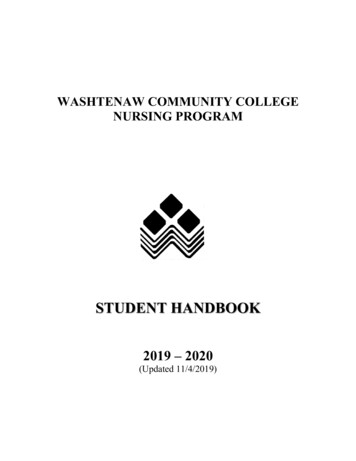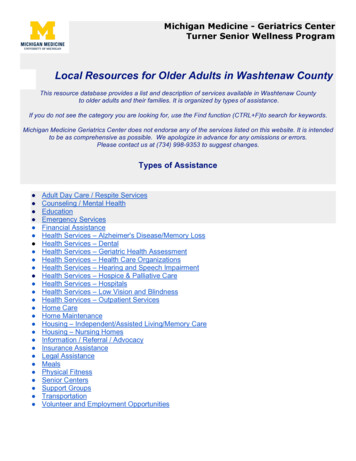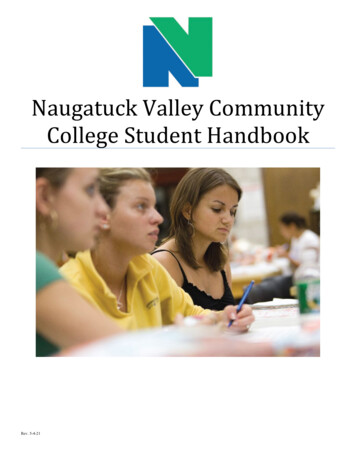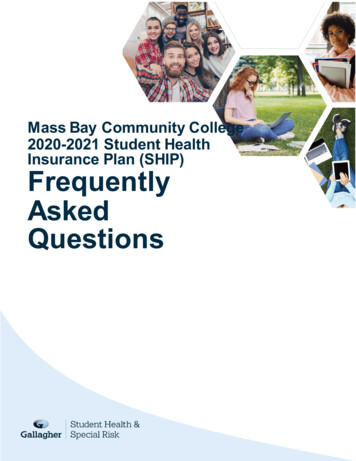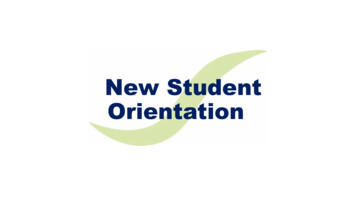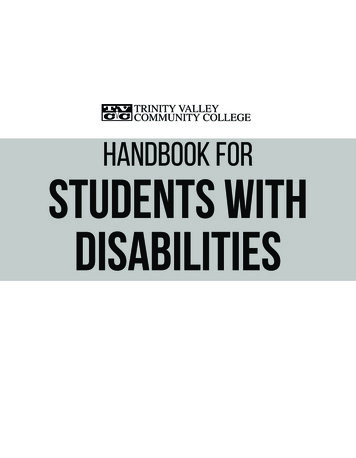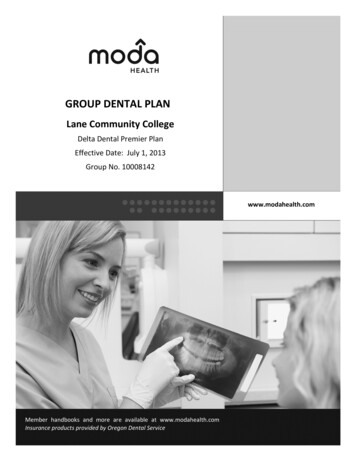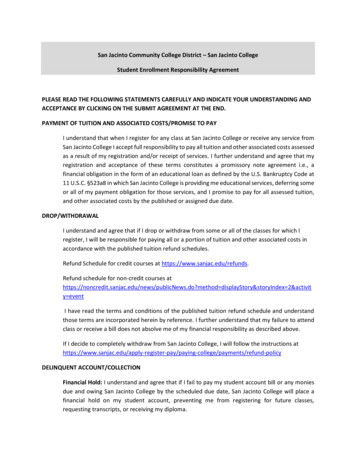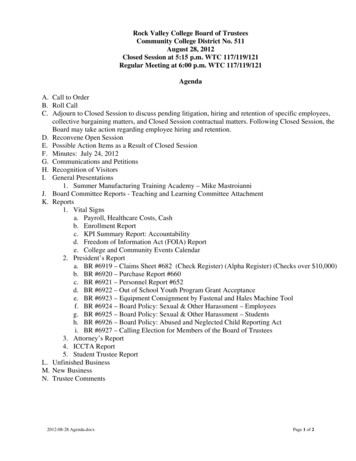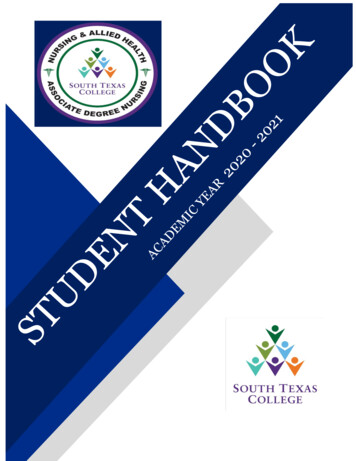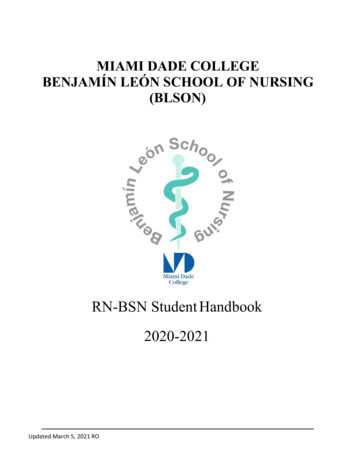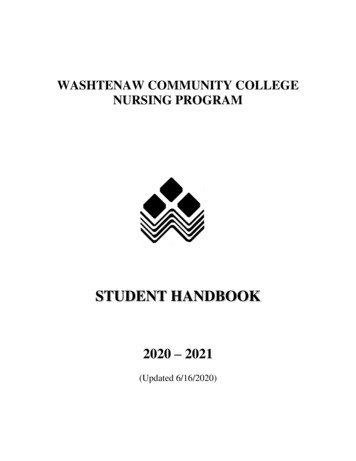
Transcription
WASHTENAW COMMUNITY COLLEGENURSING PROGRAMSTUDENT HANDBOOK2020 – 2021(Updated 6/16/2020)
TABLE OF CONTENTSDirectory .5-6Introduction to Nursing at WCC 7Accreditation .8WCC Mission .8WCC Policies .9Disciplinary Process 9Mission, Philosophy, Organizing Framework, Outcomes, and Assessmentof the Nursing Department .10-12Competencies and Courses; and System Requirements12-17Table 3: Required Course Descriptions of the WCC Nursing Programby Semester and Course Table 4: General and Specific competencies of the WCC NursingProgram by Semester and Course .Nursing Program Policies18A. A. Program Progression Guidelines .19B. B. Graduation Requirements: APNURS and APNURL .19C. C. Grading Procedure 20D. D. Testing Policy .21E. E. Course Failure Policy 21F. F. Complaint/Grievances Procedures .21G. G. Program Re-Admission Policy 22H. H. Program Completion: Time Requirements 22I.I. Communication 22J.J. Social Media/Networking 22K.L.
M.Lab/Clinical Course RequirementsN. A. Skills Lab (Philosophy and Procedures) 23O. B. Human Patient Simulation .25P. C. Clinical/Class Rules/Attendance 26Q. D. Examples of Unsafe or Unsatisfactory Practice .28R. Patient-centered Care 28S. Teamwork and Collaboration 29T. Safety and Quality Improvement 29U. Information and Technology .29V. Clinical Judgment/Evidence-based Practice .30W. Professionalism/Leadership 30X. E. Dress Code Requirements 32Y. F. Equipment/Supplies 34Z. G. ACEMAPP .34AA.H. Drug Free Environment .35BB. I. Emergency Closing Procedures .35CC. J. Health Requirements 36DD. Abilities Statement 36EE. Physical Examination and Immunizations 36FF. Student Responsibilities 37GG. Recommendation for Clinical Experience Restrictions .38HH.K. Guidelines for Infection Control in Health Care Personnel 39-40II.JJ.KK.LL.
AppendiciesMM.A. Course Sequence: Associate in Applied Science (APNURS) 42NN.B. Course Sequence: Associate in Applied Science (APNURL) 43OO.C. Nursing Practice Act (Public Health Code) 44PP. D. Michigan Right to know Law 45QQ.E. Nursing Program Code of Conduct 46-48RR. F. Licensing Examination Information .49SS. G. Abilities Statement Document 50TT. H. Lab Referral Form .51UU.I. Written Counseling Form .52VV.J. Transportation Waiver of Liability 53WW.K. COVID Addendum 54-55XX.L. Safe Use of Nursing Supplies Waiver 56YY.All policies and procedures as stated in this handbook are subject to change at anytime at the discretion of the College.
Washtenaw Community College4800 East Huron River DriveAnn Arbor, MI 48105-4800Nursing DepartmentTechnical & Industrial (TI) BuildingDIRECTORYValerie Greaves, DNP, MSN, MSA, RNDean of Health Sciences(734) 973-3474Office: TI 234vgreaves@wccnet.eduMelinda HarrisonSecretary to the Dean(734) 973-3474Office: TI 234mharriso@wccnet.eduDirector ofNursing:Joanne Yastik, PhD, RN, CNEEMU/WCC Collaborative Coordinator(734) 477-8704Office: TI 122Bjyastik@wccnet.eduDepartmentChair:Theresa Bucy, DNP, APRN, NP-C, CNELPN to RN(734) 677-5015Office: TI 122 Ktbucy@wccnet.eduKiah JobeSecretary to the Nursing Department(734)677-5184kjobe@wccnet.eduMarva Brooks, PhD, MSN, RNConcepts III(734) 677-5012Office: TI 122 Wmaebrooks@wccnet.eduMary Burns-Coral, MSN, RN, CNEConcepts IPharmacology(734) 477-8980Office: TI 122 Fmburnscoral@wccnet.eduHope Delecke, MSN, APRN-BC, CHSEConcepts IV(734) 973-3457Office: TI 122 Uhdelecke@wccnet.eduTheresa Dubiel, MSN, RNNursing Concepts II(734) 973-3615Office: TI 122 Ctdubiel@wccnet.eduDeAnna Gapp, PhD, MSN, RNNursing Concepts I(734) 249-5915Office: TI 122 Gdgapp@wccnet.eduAdministrator:Full-timeFaculty:
Sherry MacDonald, MSN, APRN, FNP-BC,CCMNursing Concepts IV(734) 677-5001Office: TI 122 Xsmmacdonald@wccnet.eduBen Morhan, BSN, RN, CHSESIRC Lab Coordinator(734) 477-8975Office: TI 211 Abmorhan@wccnet.eduAlisha Noel, MSN, RN, AGCNS-BC, PCCN-KConcepts II(734) 677-5075Office: TI 122 Vanoel@wccnet.eduMelina Roberts, MSN, RNNursing Concepts I(734) 973-3537Office: TI 122 Jmsrobert@wccnet.eduPam Tolmoff, MSN, APRN, CPNP-PCNursing Concepts III(734) 973-3302Office: TI 122 Eptolmoff@wccnet.edu(734) 973-3666Office: TI 122 Astravis@wccnet.edu(734) 477-8561Office: TI 122 AAklehn@wccnet.edu(734) 973-3358Office: TI 122Health ProgramsCounselor:Susan Travis, M.A., L.P.C.Health ProgramsAdvisorKarolyn Lehn, M.A., L.L.P.C.Support Staff:TI 122 Pod SecretaryPart TimeLab/ClinicalAssistant:Kate WestfallHealth Data Coordinator(734) 677-5037Office: TI 211kmwestfall@wccnet.eduPart TimeNursing ClinicalCoordinator:Theresa Bixler, BSNClinical Coordinator(734) 973-3463Office: TI 122 Ytbixler@wccnet.eduDocument SupportOrientation tion@wccnet.eduNursing LabLocations:TI 101 – Skills/Simulation LabTI 110 – Simulation SuiteTI 203 – Skills LabTI 205 – Skills LabTI 209 – Skills/Simulation LabFax:(734) 677-5458
WELCOME TO NURSING AT WCCIt is our pleasure to welcome you to Nursing at WCC! This handbook is designed with the student inmind! Within, you will find helpful information about your rights and responsibilities as a participant inthe nursing program. Please note that the nursing program follows all the policies of WCC. However, dueto nursing professional standards, clinical agency requirements, and accreditation expectations there aretimes when more precise standards must apply, as explained in this handbook.There are three admission pathways to nursing at Washtenaw Community College. All three pathwayslead the student to an Associate in Applied Science: RN degree and all graduates are eligible to takethe RN licensure exam (NCLEX-RN).1.Associate in Applied Science: RN Program (APNURS) - TraditionalThe APNURS prepares students for the National Council Licensure Exam (NCLEX-RN).Individuals will also earn credits that will apply to Bachelors of Nursing (BSN) completionprograms. Learning opportunities are in the classroom, simulation lab, clinical setting andcommunity. Students are empowered to succeed in a changing healthcare environment.2.Associate in Applied Science: RN Program (APNURS) - EMU/WCC CollaborativeStudents start the associate degree nursing program at WCC after applying to EMU’s BSNprogram. Through transfer credit and coursework, the Collaborative student meets programeligibility requirements. The student finishes the AAS degree at WCC and is eligible to take theRN licensure exam. With one more semester of study, the student then finishes the BSN at EMU.3.Associate in Applied Science: LPN to RN Program (APNURL)Students who are licensed LPNs meed eligibility requirements through work experience, previouscoursework, and LPN licensure. Students are admitted to a transition course, then mainstreaminto the final two clinical courses. Upon completion, the student is eligible to take the RNlicensure exam.CURRICULUMWCC uses a concept-based curriculum (CBC), designed based on the national trends in nursingeducation. The CBC covers 36 nursing concepts applicable across the lifespan to a variety of patientconditions and patient care settings. Courses are 15 weeks in length. All clinical courses are mixed mode,meaning there is an online component, an on-campus component, and a clinical (off campus) component.
ACCREDITATIONInstitutional AccreditationWashtenaw Community CollegeAccredited by:The Higher Learning Commission Association230 South LaSalle Street, Suite 7-500Chicago, Illinois 60604-1413(800) hlc.orgContact: 734-973-3300 for information about Washtenaw Community CollegeProgram Accreditation and ApprovalsThe Washtenaw Community College Nursing Program has the approval of the Michigan Department ofLicensing and Regulatory Affairs and is accredited through the National League for Nursing AccreditingCommission (NLNAC) since 1996. Effective May 6, 2013, the NLNAC changed its name and is now theAccreditation Commission for Education in Nursing (ACEN).Michigan Department of Licensing &Regulatory Affairs Bureau of Health ServicesBureau of Health Professions Licensing DivisionBoard of NursingPO Box 30670Lansing, MI 48909(517) 335-0918http://www.michigan.gov/laraAccreditation Commission forEducation in Nursing (ACEN)3343 Peachtree Rd NE, Suite 850Atlanta, GA 30326(404) 975-5000Fax: (404) 975-5020www.acenursing.orgGraduates of the APNURS and APNURL Nursing Programs are eligible to take the National CouncilLicensure Examination – Registered Nurse (NCLEX-RN) and obtain licensure as a Registered Nurse(RN) through the Michigan Board of Nursing. The WCC School Code is US09408300.WCC MISSIONWashtenaw Community College (WCC) strives to make a positive difference in people’s livesthrough accessible and excellent educational programs and services. We provide a caring, open door teaching and learning environment. We provide excellent teaching, counseling, and support services. We reach out to people who have limited income or other barriers to success. We enable people to progress in their academic and career pursuits. We work in partnership with the communities we serve.The missions of the College and Nursing Department are congruent in their focus on empoweringstudents to realize their goals of improving their own lives, as well as the lives of others.
WCC POLICIESThe Nursing Department follows WCC policies including the WCC Student Right, Responsibilities andConduct Code (SRRCC). Nursing students are expected to become familiar with and follow thesepolicies. See: http://www.wccnet.edu/trustees/policies/4095 Each semester, the course syllabi and/orBlackboard shell will contain information and this link to the Board policies and other information usefulto students.WCC DISCIPLINARY PROCESSThe student will be notified of unacceptable behavior(s), infractions of this handbook, or violations ofthe WCC Student Rights, Responsibilities, and Conduct Code (SRRCC) by either the program faculty orappointed College staff (depending on the nature and severity of the situation). The student will have theopportunity to respond to any allegations.The SRRCC is found on page: http://www.wccnet.edu/trustees/policies/4095/.
WCC NURSING PROGRAM PHILOSOPHYThe Nursing Program philosophy incorporates the WCC mission, professional nursing values, as wellas a model for practice (Nursing Process). These principles serve as guidelines in the design and deliveryof our nursing curriculum. The concepts of QSEN (Quality and Safety Education in Nursing) arethreaded throughout the program’s organizing framework.Nursing is an art and science that identifies, mobilizes, and develops strengths of the patient throughacquired skill, professionalism, knowledge, and competence. Professional nurses use critical thinkingand methods of scientific inquiry to gather and analyze data, recognize patterns, establish priorities, andexecute evidence-based practice.Nursing education is an interactive teaching-learning process. Education encompasses critical thinkingand inquiry, caring, communication, creativity, collaboration, cultural awareness, and professionalcompetence. Student-centered teaching includes assessing, advising, guiding, facilitating, sharingknowledge, and evaluating. Learning is a lifelong, self-directed process of change that begins with basicconcepts and progresses to complex knowledge and critical thinking skills.The ADN graduate nurse is prepared to work in a variety of healthcare settings to assist individuals tomeet their health needs. The focus is on providing safe care that is patient-centered, culturally-aware,respectful, reflective, and based on nursing knowledge. ADN graduates utilize the nursing process,technology, critical thinking, sound clinical judgment and effective communication skills in all aspectsof care. This care is individualized and comprehensive. ADN graduates use these same skills to managea group of patients and to provide leadership to other health care team members.Model for Practice: Nursing ProcessThe Nursing Process model is currently used by practicing nurses at all levels of professional preparationand consists of five or six (depending on the source) components: assessment; diagnosis; outcomeidentification/planning; implementation; and evaluation. Details of this model are explained inthe American Nurses Association’s Nursing: Scope and Standards of Practice (2015). TheNursing Process is used throughout the WCC nursing program courses and clinical experiences andprovides an overarching structure for learning nursing-related knowledge and skills. Students areconsistently exposed to this model both in theory and clinical courses so that they are prepared toimplement it once they begin their careers.MISSION OF THE WCC NURSING DEPARTMENTThe mission of the Washtenaw Community College Nursing Program is to prepare WCC students topractice as exemplary and respected registered nurses in the community. This mission promotes theholistic development of each student into a nurse who practices as a professional: competently, ethically,safely, and compassionately for the good of the patient, family, and community. As life- long learners,WCC educated nurses will take active roles in this dynamic profession.
WCC NURSING PROGRAM ORGANIZING FRAMEWORKAn organizing framework provides a scaffold for the nursing curriculum that encompasses both thenursing knowledge and skills needed by registered nurses. This framework is composed of six corecomponents.Professionalism / Leadership is behavior within the ethical and legal guidelines as defined by thenurse practice act to achieve safe, quality patient-centered care. Leadership is the ability to influenceothers to work together in the pursuit of a shared goal.Patient-Centered Care characterizes the patient's values, preferences, goals, and needs as the centralfocus of safe, competent, culturally-aware nursing care.Teamwork and Collaboration is the ability of the nurse to function effectively within interprofessional teams to foster open communication, mutual respect, and shared decision-making toachieve quality patient care.Clinical Judgment / Evidence-Based Practice is the practice of nursing in which the nurse makesclinical decisions on the basis of the best available current research evidence, the nurse's expertise andthe needs and preferences of the patient using various tools such as the nursing process, criticalthinking and clinical judgment principles.Safety and Quality Improvement includes minimizing risk of harm to patients and providers andusing data to monitor outcomes of care processes through improvement methods to maximize thequality of patient care.Informatics and Technology involves using methods and tools to communicate, manage knowledge,reduce error, and/or support decision-making.Adapted from www.QSEN.org.WCC NURSING END-OF-PROGRAMSTUDENT LEARNING OUTCOMESThe core components in the framework take the form of general competencies for the program. Studentsare expected to achieve the listed outcomes at the completion of the Associate Degree Nursing program.1. Provide patient centered care across the lifespan in a variety of healthcare settings.2. Collaborate and communicate effectively with the patient family and health care team.3. Provide safe patient care and participate in processes that maximize quality of patientoutcomes.4. Utilize informatics and technology to increase communication, decision–making, knowledgemanagement, and error reduction.5. Use evidence based clinical judgement when providing care to patients/families throughout thelifespan.6. Demonstrate professionalism expected of registered nurses adhering to the current standards ofpractice and exhibiting beginning leadership skills.
ASSESSMENT OF END-OF-PROGRAM STUDENT LEARNING OUTCOMESThe Nursing program offers learning experiences to assist students in becoming beginning registerednurses who are able to provide patient care accurately, competently, and safely. The extent to whichstudents achieve the program outcomes are assessed by the following measures:1. National League for Nursing End of Program Evaluation (orequivalent)2. NUR 288 clinical evaluation tool based on six graduate outcomesASSESSMENT OF END OF PROGRAM LEARNING OUTCOMES1. Performance on NCLEX-RN - first time test taker pass rate2. Job Placement - Based on graduate survey3. Program Completion - As evident by graduationCOMPETENCIES AND COURSESSpecific competency statements have been identified for each end-of-program student learning outcome.These statements provide direction for a logical progression in the development of critical skills. Studentsdevelop their skills in these competencies through a sequenced set of courses and clinical experiences,over a four-semester period. Tables 1 and 2 show the competencies and the course sequencing. TheClinical Evaluation Tool for each clinical course lists those competencies that are developed in thatcourse.The development of specific lab skills is distributed throughout the program. Each skill is linked to aparticular course, and is introduced in that course, and reinforced in other courses. Assessment measuresfor each skill have been identified, and take the following forms: quizzes for knowledge and processes;and Laboratory Skills Check Lists for rating student performance of new skills and for validatingpreviously learned skills.
Table 1. Required Course Descriptions by Semester and CourseSemester 1ENG 111: English Composition ISemester 2Semester 3Semester 4Semester 5NUR 108: Nursing Concepts I: studentswill apply foundational nursing conceptsacross the lifespan with an emphasis onlate adulthood. The organizing frameworkfor the nursing practice will be introducedincluding patient-centered care, teamworkand collaboration, safety and qualityimprovement, informatics and technology,evidence-based practice, andprofessionalism. Basic psychomotor andpsychosocial concepts and skills will bepracticed through clinical, lab andsimulation.NUR 128: Nursing Concepts II:Students will apply the nursing processto provide safe, quality nursing care forpatients with common acute and chronichealth problems across the lifespan,including care of the family during theuncomplicated childbearing experience.This course also includes clinical, laband simulation in a variety of settingswhere students will apply informatics andtechnology for effective communicationNUR 138: Nursing Concepts III:Students will use clinical judgment basedon evidence and informatics to prioritizesafe, quality care for patients withcomplex physical and mental healthproblems across the lifespan. Studentswill begin using delegation andleadership skills in managing their patientcare assignments through clinical andsimulation experiences in a variety ofsettings. Students will demonstrateprofessional conduct within current legaland ethical standards of practice.NUR 288: Nursing Concepts IV:Students will demonstrate clinicaljudgment in collaboration with the interprofessional team to prioritize safe,quality care for patients with multisystem and emergent health problems,including the high-risk childbearingexperience. Students will expand theiruse of delegation and leadership skills inmanaging their patient care assignmentsthrough clinical and simulationexperiences in a variety of settings.Students will expand their knowledge ofpsychomotor, affective, cognitive skills inmanaging their patient assignm
Please note that the nursing program follows all the policies of WCC. However, due to nursing professional standards, clinical agency requirements, and accreditation expectations there are times when more precise standards must apply, as explained in this handbook. There are three admi
